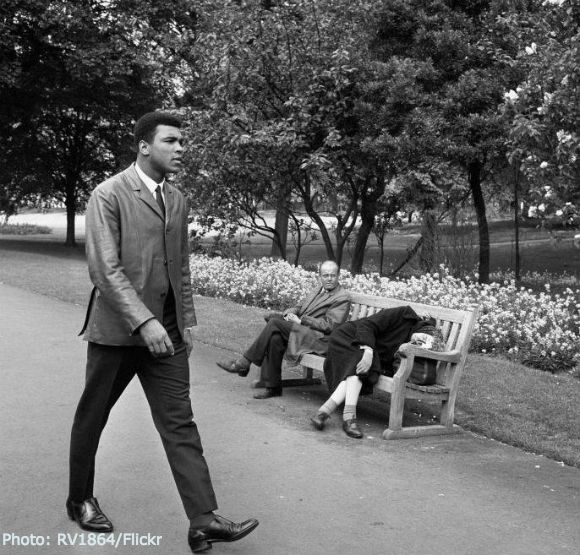Muhammad Ali

He's still the most recognizable man on earth. And over forty years after he burst upon the scene as a gold medal winner at the 1960 Olympics, in Rome, Muhammad Ali remains a magical figure, known and loved throughout the world. Accolades Muhammad has received over the last decade include Sports Illustrated' s "Athlete of the Century," the BBC's "Sports Personality of the Century," the World Sports Award's "World Sportsman of the Century," the State of Kentucky's "Kentuckian of the Century." GQ magazine dubbed him "Athlete of the Century."
As a boxer, Muhammad brought unprecedented speed and grace to his sport, while his charm and wit changed forever what the public expected a champion to be. His accomplishments in the ring were the stuff of legend two fights with Sonny Liston, where he proclaimed himself "The Greatest" and proved he was; three epic wars with Joe Frazier , the stunning victory over George Foreman in Zaire; and dethroning Leon Spinks to become heavyweight champion for an unprecedented third time. But there was always far more to Muhammad than what took place in a boxing ring.
Muhammad's life and career have been played out as much on the front pages of national and international newspapers as on the inside sports pages. His early embrace of the Nation of Islam and his insistence on being called Muhammad Ali instead of his "slave name," Cassius Clay, heralded a new era in black pride. His refusal to be inducted into the United States Army anticipated the growing antiwar movement of the 1960's. And his willingness to stage his much promoted and publicized fights in such far flung locales as Kinshasa, Manila, and Kuala Lumpur signaled a shift from superpower dominance towards a growing awareness of the developing world.
Daring to go against political policy to help people in need, Muhammad attended goodwill missions in Afghanistan and North Korea; delivered sorely needed medical supplies to an embargoed Cuba; traveled to Iraq and secured the release of 15 United States hostages; and upon Nelson Mandela's release, journeyed to South Africa on a benevolent mission.
Today, championing the causes of the developing world has become a major focus of Muhammad's life. He has been instrumental in providing over 232 million meals to the world's hungry. Traveling across continents, he has hand delivered food and medical supplies to such needy sites as the Harapan Kita Hospital for Children in Jakarta, Indonesia; the street children of Morocco; and Sister Beltran's orphanage for Liberian refugees in the Ivory Coast, to name just a few.
In addition to his international efforts, Muhammad is equally devoted to helping charities at home. He has visited countless numbers of soup kitchens and hospitals. He has helped such organizations as the Chicago based adoption agency, The Cradle; the Make A Wish Foundation; the Special Olympics' organization Best Buddies; Herbert E. Birch Services, an organization that runs a school for handicapped children and young adults, in addition to a summer camp for children infected with AIDS; and "Fight Night" which generates funds for the "Muhammad Ali Parkinson Research Center" at Barrow Neurological Institute, in Phoenix, Arizona. At the State Capitol in Michigan, he advocated new laws protecting children. In schools across America, he taught children the virtues of tolerance and understanding through his book HEALING. Muhammad has perhaps raised more money for American charities than any other living person.
For his tremendous humanitarian efforts, Muhammad has been the recipient of countless awards. In addition to being honored by Amnesty International with their "Lifetime Achievement Award," the Secretary General of the United Nations bestowed him with a citation as "United Nations Messenger of Peace." He was also named the "International Ambassador of Jubilee 2000," a global organization dedicated to relieving debt in developing nations. Other honors include an "Essence Award," an "XNBA Human Spirit Award" and recognition from the National Urban League, 100 Black Men, Givat Haviva, the Oleander Foundation, The National Conference of Christians and Jews, Time magazine, and former President Jimmy Carter, who cited Muhammad as "Mr. International Friendship."
Muhammad's dream to share his inspiration with the world is being realized through the "Muhammad Ali Museum and Education Center" in Louisville, Kentucky, the city where Muhammad's story began. The Center will embrace Muhammad's fame and boxing career, though its mission reaches far beyond that to explore the beliefs and convictions that allowed Muhammad to become the person he is today. The Center will appeal to the heart, spirit, and imagination. It will inspire both children and adults to form new commitments in their lives in areas of personal growth, integrity and respect for others, and it will give them the tools to make these commitments happen.
Whether it's teaching tolerance and understanding, feeding the hungry, following the tenets of his religion, or reaching out to children in need, Muhammad All is devoted to making the world a better place for all people. No athlete has ever contributed more to the life of his country, or the world, than Muhammad Ali.